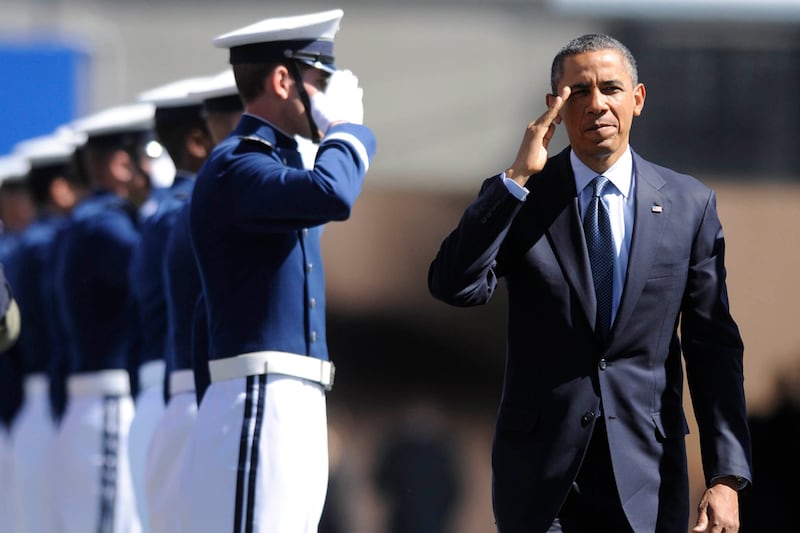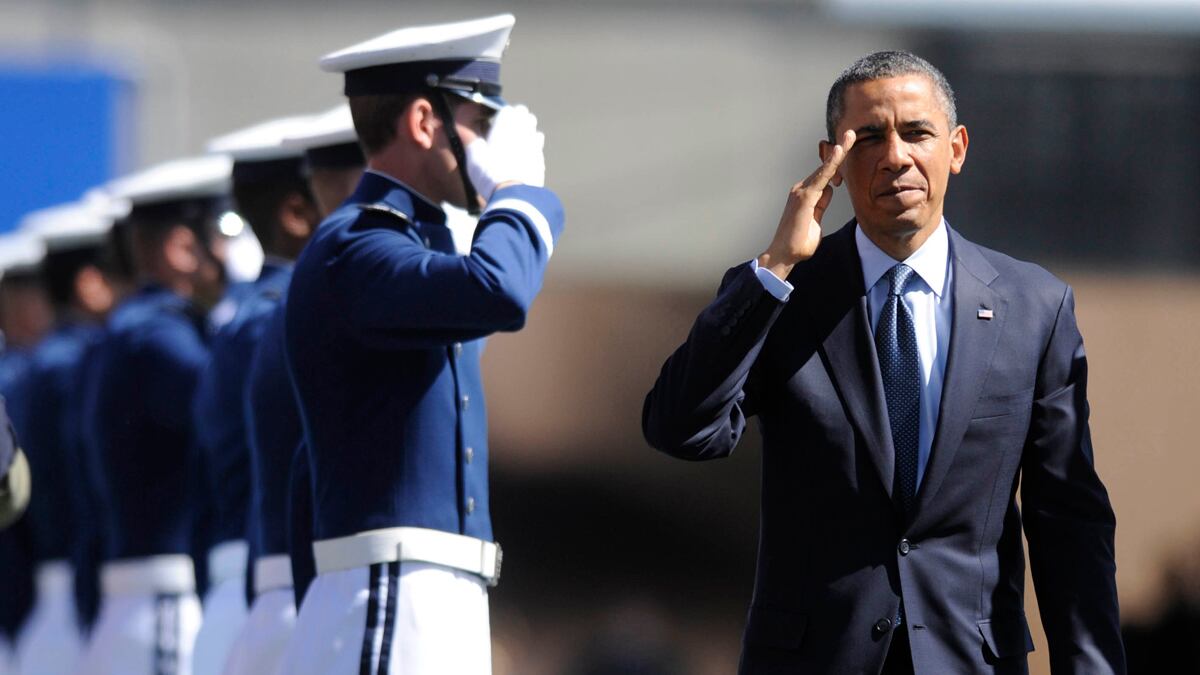Two presidential debates and no real mention of our troops, despite the ongoing war in Afghanistan.

Here’s why: 68 percent of Americans think the war in Afghanistan is going somewhat or very badly, and the same percentage thinks we should withdraw entirely or start drawing down troops now. Compound that with less than 1 percent of Americans serving in the active-duty military, so much of the nation feels no real stake in or connection to the war effort. That disconnect and distance helps explain how, at this time of collapsing support for the government, the press, and other institutions, three of four Americans say they’ve maintained their confidence in the military.
A study released this week by the Center for a New American Security (PDF) separated independent and undecided voters into two groups. The first left their votes entirely unchanged when told that most military and veteran voters are pro-Mitt Romney. The second group’s support for President Obama shot up by 9 points when told that military and veteran voters are pro-Obama. The implication seems to be that these voters assume the military backs the GOP, which in turn means a Democrat has much more to gain among those voters if he can claim the military stands behind him.
Despite the many efforts Obama has made to appeal to younger soldiers and veterans, Romney has maintained a 66–26 lead among military voters. Does this explain why both sides have been content to keep our foreign engagements, and our returning troops, at arm’s length? Even as the war in Afghanistan slogs toward a close and our troops return home, polls show most Americans won’t cast their ballots on the issue this year.
We are vaguely claiming victory in this unpopular war, having announced that the last scheduled troops will be home by the end of 2014, a schedule both would-be presidents seem to agree on. “Al Qaeda’s leadership has been devastated, and Osama bin Laden will never threaten us again,” Obama said at the Pentagon recently. “Our country is safer and our people are resilient.” It’s a nice statement but says nearly nothing to the men and women who are still fighting in a war we’ve written off even before ending.
Are we safer? Are we prepared for what happens after these wars end? What is the aftermath going to look like over the next presidential term? Neither candidate has much to say on the topic. Obama, who once framed Afghanistan as the necessary war that was overlooked for Iraq, no longer brings it up unless asked. And Romney has offered little except bromides about “strength,” while at the same time saying he too would end the war on schedule.
We are in desperate need of a more serious conversation and debate about our war in this presidential election—the third one since the war began, the first one since 1944 where neither of the presidential candidates has served in the military, and the first one since 1932 where neither major-party ticket has a veteran on it. Despite the political cone of silence, the consequences continue:
A record number of soldiers are now being killed by Afghan troops.
Our military members are taking their own lives at unprecedented rates, with an average of one a day per active duty and 18 a day for vets.
Forty-five percent of the 1.6 million veterans from the wars are now seeking compensation for service-related injuries. That is more than double the numbers that we saw after the Gulf War in the early 1990s. And post-9/11 veterans are claiming eight to 14 ailments on average, compared with Vietnam vets, who claimed fewer than four.
There has been a marked increase of sexual-assault cases—19,000 incidents reported in 2010 alone. If you serve in the U.S. military and you rape or sexually assault a fellow service member, chances are you won’t be punished, according to CNN. Indeed, you have an estimated 86.5 percent chance of keeping your crime a secret and a 92 percent chance of avoiding a court-martial.
Alcohol abuse and domestic violence accounts are on the rise. And a troubling number of scandals have involved misconduct from active-duty U.S. troops, both abroad and at home.
Romney was recently criticized for not mentioning the troops in his GOP acceptance speech. During an interview with Fox News’s Bret Baier, the candidate was asked if he regretted the much-criticized omission. “I only regret you’re repeating it day in and day out,” Romney replied. “When you give a speech you don’t go through a laundry list, you talk about the things that you think are important, and I described in my speech my commitment to a strong military, unlike the president’s decision to cut our military. And I didn’t use the word troops, I used the word military. I think they refer to the same thing.”
Are they the same thing? Comparing people (troops) to institutions (military) is confusing an organization that provides a product with the people who serve in it. These differences, although subtle, are quite significant. It’s the same sort of error as confusing Sunnis and Shias—a sign the speaker isn’t seriously engaged with the subject at hand.
On a similar note, veterans are not the same as active-duty service members. Active duty is used to identify the service members now in one of our five military branches: the Army, Air Force, Navy, Marine Corps, and Coast Guard. Since the National Security Act of 1947, the U.S. military falls under the Department of Defense (DoD). Therefore, all mental-health services for active duty fall under the DoD. Veterans are service members who have left the military and are now part of civilian life. Their benefits, including mental health, fall under the Veterans Affairs (VA). The DoD and VA are two completely separate departments and have a long history of rarely talking and cooperating with each other.
Romney has detailed a plan to help our vets if he is elected. Never once are active-duty service members—who, of course, will be vets one day—mentioned.
On Aug. 31, 2012, Obama signed an executive order titled “Improving Access to Mental Health Services for Veterans, Service Members, and Military Families.” Again, much needed emphasis was placed on providing help for our vets, but there was minimal mention about programming for our men and women now serving.
Does this mean we haven’t learned from our mistakes and that we still aren’t ready yet to take a proactive stance? We throw money and Band-Aids at problems that perhaps could have been avoided if meaningful, intellectual dialogue could take place.
When the draft was in effect and the burden of serving was shouldered across the population, I’d have to assume that care for our troops, at a minimum, made for a campaign conversation. So what happens if we continue to sweep things under the rug?
“Issues like minor depression, anxiety and sleep disturbances ... begin to surface after a service member has been home for more than a year, and start to reintegrate with their family,” Bruce Shahbaz, a medical analyst with the Army’s Suicide Prevention Task Force told Time. “I liken it to a pot that’s on simmer.”
I think we all agree that after a decade of war, reintegration poses a significant challenge for our troops. In addition to finding work—vets today have a higher unemployment rate than the general population—our service members are overloaded with other obstacles to overcome. Despite managing the stress of marriage and parenthood, many of our soldiers are dealing with a host of health problems, including physical impairments and invisible wounds.
It’s not as though we’ve forgotten them completely. The military has made a concerted effort to understand PTSD and TBI better. The DoD and VA have spent millions on research and suicide prevention programs. But they’ve been plagued with one step forward, two steps back. They continue to be bogged down with allegations of substandard mental-health care.
Perhaps we should be asking, why is this the first time since 1952 that a GOP acceptance speech did not mention war? Are we partly to blame as Americans, because we are disconnected from this fight, thus rendering it not “important”? Isn’t this the time to demand the conversation be had? After all, our troops are not a partisan issue. They’re an American issue.





